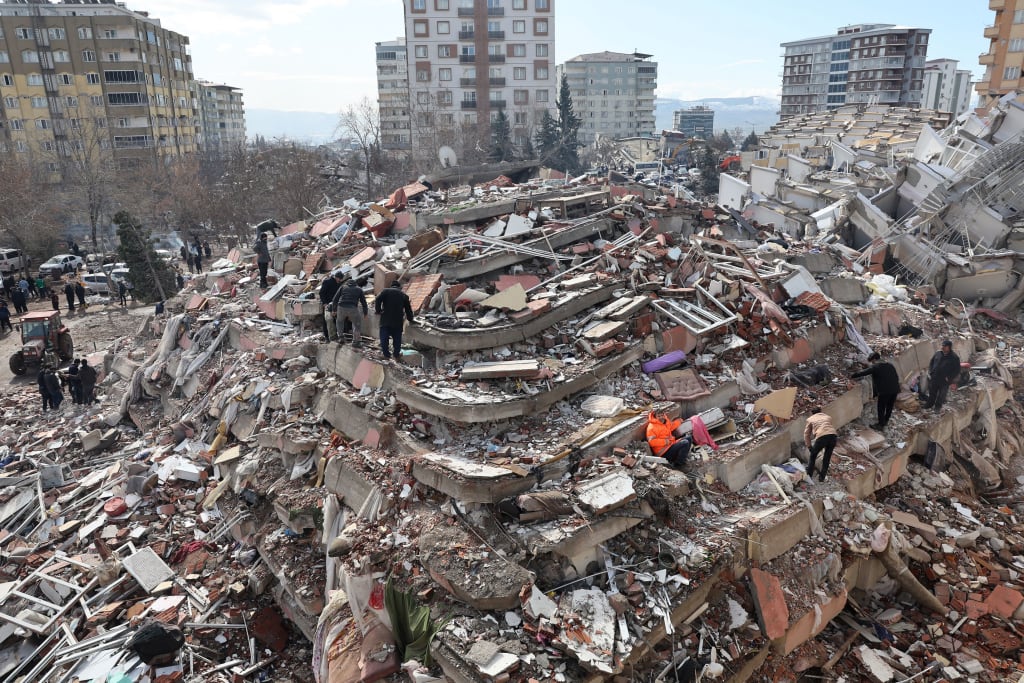Deadly Earthquake Strikes Turkey
A powerful earthquake with a magnitude of [insert magnitude] hit [insert location], leaving a trail of destruction and loss of life.
By NaveenkumarPublished about a year ago • 3 min read
Like
Share

- On October 30, 2020, Turkey was hit by a devastating earthquake that claimed the lives of dozens of people, injured hundreds more, and left many more homeless.
- The earthquake, which measured 7.0 on the Richter scale, struck the city of Izmir in the western part of the country.
- The earthquake occurred at 2:51 pm local time and was centered in the Aegean Sea, about 17 kilometers off the coast of Izmir.
- The tremors were felt as far away as Istanbul, which is more than 500 kilometers from the epicenter.
- The earthquake caused widespread damage in Izmir, with many buildings collapsing or being severely damaged.
- The worst affected areas were the districts of Bornova, Bayrakli, and Seferihisar.
- Many people were trapped under the rubble of collapsed buildings, and rescue workers worked tirelessly to try to save as many lives as possible.
- The Turkish government immediately sprang into action, sending rescue teams, including the country's National Medical Rescue Team, to the affected areas.
- The government also established a crisis center to coordinate relief efforts and provide assistance to those in need.
- The earthquake has been described as the worst to hit Turkey in nearly a decade.
- The last major earthquake in the country occurred in 2011, when a 7.2-magnitude earthquake hit the eastern province of Van, killing more than 600 people.
- The earthquake in Izmir also caused significant damage to the city's infrastructure, with roads and bridges being closed and many areas experiencing power outages.
- The Turkish government has promised to provide financial assistance to those affected by the earthquake and has called for international aid to help with the relief effort.
- In the aftermath of the earthquake, many people were left without homes and had to seek shelter in tents or other temporary accommodation.
- The Turkish Red Crescent and other aid organizations worked to provide food, water, and other essential supplies to those in need.
- The earthquake in Izmir was a stark reminder of the dangers posed by earthquakes and the need for preparedness and resilience in the face of such disasters.
- Turkey is located in a seismically active region, with several major fault lines running through the country.
- As a result, earthquakes are a constant threat, and the country has a long history of earthquakes, some of which have been very destructive.
- The Turkish government has taken steps in recent years to improve earthquake preparedness and to ensure that buildings and infrastructure are constructed to withstand earthquakes.
- However, more needs to be done to ensure that communities are able to withstand the impact of earthquakes and that adequate resources are in place to respond to disasters when they occur.
- One of the challenges facing Turkey is the large number of older buildings that were constructed before modern seismic codes were in place.
- These buildings are often not earthquake-resistant, and many of them are at risk of collapse in the event of a major earthquake.
- The government has launched a program to retrofit these buildings and to ensure that new buildings are constructed to modern seismic standards.
- In addition to preparedness measures, there is also a need for effective response and recovery efforts.
- The Turkish government has a well-established disaster management system, but the earthquake in Izmir highlighted the need for further improvements, particularly in the areas of search and rescue, medical response, and temporary shelter.
- The earthquake in Izmir also highlighted the importance of international cooperation in responding to disasters.
- The Turkish government called for international aid in the aftermath of the earthquake, and several countries, including Greece, France, and the United Kingdom, offered assistance.
- The European Union also pledged its support, with the European Commission activating its Emergency Response Coordination Center to help coordinate relief efforts.
- In conclusion, the earthquake in Izmir was a tragic event that resulted in the loss of many lives and the displacement of thousands of people. The Turkish government and aid
About the Creator
Naveenkumar
"Crafting words, shaping stories"






Comments
There are no comments for this story
Be the first to respond and start the conversation.